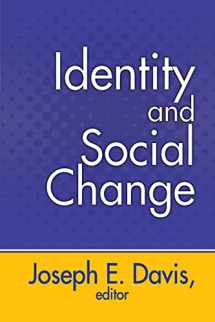
Identity and Social Change
ISBN-13:
9781412857109
ISBN-10:
1412857104
Edition:
1
Author:
Joseph E. Davis
Publication date:
2015
Publisher:
Routledge
Format:
Paperback
220 pages
FREE US shipping
Book details
ISBN-13:
9781412857109
ISBN-10:
1412857104
Edition:
1
Author:
Joseph E. Davis
Publication date:
2015
Publisher:
Routledge
Format:
Paperback
220 pages
Summary
Identity and Social Change (ISBN-13: 9781412857109 and ISBN-10: 1412857104), written by authors
Joseph E. Davis, was published by Routledge in 2015.
With an overall rating of 4.2 stars, it's a notable title among other
books. You can easily purchase or rent Identity and Social Change (Paperback) from BooksRun,
along with many other new and used
books
and textbooks.
And, if you're looking to sell your copy, our current buyback offer is $0.36.
Description
Identity and Social Change examines the thorny problem of modern identity. Trenchant critiques have come from identity politics, focusing on the construction of difference and the solidarity of minorities, and from academic deconstructions of modern subjectivity. This volume places identity in a broader sociological context of destabilizing and reintegrating forces. The contributors first explore identity in light of economic changes, consumerism, and globalization, then focus on the question of identity dissolution. Zygmunt Bauman examines the effects of consumerism and considers the constraints these place on the disadvantaged. Drawing together discourses of the body and globalization, David Harvey considers the growth of the wage labor system worldwide and its consequences for worker consciousness. Mike Featherstone outlines a rethinking of citizenship and identity formation in light of the realities of globalization and new information technologies. Part two opens with Robert Dunn’s examination of cultural commodification and the attenuation of social relations. He argues that the media and marketplace are part of a general destabilization of identity formation. Kenneth Gergen maintains that proliferating communications technologies undermine the traditional conceptions of self and community and suggest the need for a new base for building the moral society. In the final chapter, Harvie Ferguson argues that despite the contemporary infatuation with irony, the decline of the notion of the self as an inner depth effectively severs the long connection between irony and identity.


We would LOVE it if you could help us and other readers by reviewing the book
Book review

Congratulations! We have received your book review.
{user}
{createdAt}
by {truncated_author}


